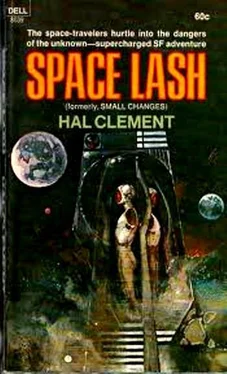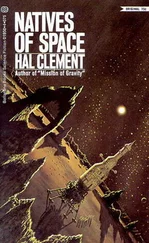Hal Clement - Space Lash
Здесь есть возможность читать онлайн «Hal Clement - Space Lash» весь текст электронной книги совершенно бесплатно (целиком полную версию без сокращений). В некоторых случаях можно слушать аудио, скачать через торрент в формате fb2 и присутствует краткое содержание. Год выпуска: 1969, Жанр: Фантастика и фэнтези, на английском языке. Описание произведения, (предисловие) а так же отзывы посетителей доступны на портале библиотеки ЛибКат.
- Название:Space Lash
- Автор:
- Жанр:
- Год:1969
- ISBN:нет данных
- Рейтинг книги:3 / 5. Голосов: 1
-
Избранное:Добавить в избранное
- Отзывы:
-
Ваша оценка:
- 60
- 1
- 2
- 3
- 4
- 5
Space Lash: краткое содержание, описание и аннотация
Предлагаем к чтению аннотацию, описание, краткое содержание или предисловие (зависит от того, что написал сам автор книги «Space Lash»). Если вы не нашли необходимую информацию о книге — напишите в комментариях, мы постараемся отыскать её.
Space Lash — читать онлайн бесплатно полную книгу (весь текст) целиком
Ниже представлен текст книги, разбитый по страницам. Система сохранения места последней прочитанной страницы, позволяет с удобством читать онлайн бесплатно книгу «Space Lash», без необходимости каждый раз заново искать на чём Вы остановились. Поставьте закладку, и сможете в любой момент перейти на страницу, на которой закончили чтение.
Интервал:
Закладка:
Silbert waited for some of it to settle, but lacked the patience to wait for it all. When he opened the door into the larger lock chamber the men were accompanied through it by several large globules of boiling liquid.
“Wasteful, but helps a bit,” remarked the spaceman as he opened the outside portal and the two were wafted through it by the escaping vapor. “Watch out — hang on there. You don't have escape velocity, but you'd be quite a while getting back to the surface if you let yourself blow away.” He seized a convenient limb of Bresnahan's space armor as the younger man drifted by, and since he was well anchored himself to the top rung of the ladder was able to arrest the other's flight. Carefully they stepped away from the hatch, Silbert touching the closing button with one toe as he passed it, and looked for the orbiting station.
This, of course, was directly overhead. The same temptation which Bresnahan had felt earlier to make a jump for it came back with some force; but Silbert had a safer technique.
He took a small tube equipped with peep-sights from the equipment clip at his side and aimed it very carefully at the projecting hub of the wheel-shaped station — the only part of the hub visible, since the station's equator was parallel to that of Raindrop and the structure was therefore edge-on to them. A bright yellow glow from the target produced a grunt of satisfaction from Silbert, and he fingered a button on the tube. The laser beam, invisible in the surrounding vacuum, flicked on and off in a precisely timed signal pattern which was reported faithfully by the source-return mirror at the target. Another response was almost as quick.
3
A faintly glowing object emerged from the hub and drifted rapidly toward Raindrop, though not quite toward the men. Its details were not clear at first, but as it approached it began to look more and more like a luminous cobweb.
“Just a lattice of thin rods, doped with luminous paint for spotting and launched from the station by a spring gun,” explained Silbert. “The line connecting it with the station isn't painted, and is just long enough to stop the grid about fifty feet from the water. It's launched with a small backward component relative to the station's orbit, and when the line stops it it will drift toward us. Jump for it when I give the word; you can't miss.”
Bresnahan was not as certain about the last statement as his companion seemed to be, but braced himself anyway. As the glowing spiderweb approached, however, he saw it was over a hundred feet across and realized that even he could jump straight enough to make contact. When Silbert gave the word, he sprang without hesitation.
He had the usual moment of nausea and disorientation as he crossed the few yards to his target. Lacking experience, he had not “balanced” his jump perfectly and as a result made a couple of somersaults en route. This caused him to lose track of his visual reference points, and with gravity already lacking he suffered the moment of near-panic which so many student pilots had experienced before him. Contact with one of the thin rods restored him, however; he gripped it frantically and was himself again.
Silbert arrived a split second later and took charge of the remaining maneuvers. These consisted of collapsing the “spiderweb” — a matter of half a minute, in spite of its apparent complexity, because of the ingenuity of its jointing — and then starting his companion hand-over-hand along the nearly invisible cord leading back to the station. The climb called for more coordination than was at first evident; the spaceman had to catch his less experienced companion twice as the latter missed his grip for the line.
Had Silbert been going first the situation might have been serious. As it was, an extra tug on the rope enabled him to catch up each time with the helpless victim of basic physics. After the second accident, the guide spoke.
“All right, don't climb any more. We're going a little too fast as it is. Just hold onto the rope now and to me when I give the word. The closing maneuver is a bit tricky, and it wouldn't be practical to try to teach you the tricks on the spot and first time around.”
Silbert did have quite a problem. The initial velocities of the two men in their jumps for the spiderweb had not, of course, been the correct ones to intercept the station — if it had been practical to count on their being so, the web would have been superfluous. The web's own mass was less than fifty pounds, which had not done much to the sum of those vectors as it absorbed its share of the men's momentum. Consequently, the men had an angular velocity with respect to the station, and they were approaching the latter.
To a seventeenth century mathematician, conservation of angular momentum may have been an abstract concept, but to Silbert it was an item of very real, practical, everyday experience — just as the orbit of a comet is little more than a set of numbers to an astronomer while the orbit of a baseball is something quite different to an outfielder. The problem this time was even worse than usual, partly because of Bresnahan's mass and still more because of his inexperience.
As the two approached the station their sidewise motion became evident even to Bresnahan. He judged that they would strike near the rim of the spinning structure, if they hit it at all, but Silbert had other ideas.
Changing the direction of the spin axis by landing at the hub was one thing — a very minor one. Changing the rate of spin by meeting the edge could be a major nuisance, since much of the apparatus inside was built on and for Earth and had Earth's gravity taken for granted in its operation. Silbert therefore had no intention of making contact anywhere but at one of the “poles” of the station. He was rather in the situation of a yo-yo whose string is winding up on the operator's finger; but he could exercise a little control by climbing as rapidly as possible “up” the cord toward the structure or allowing himself to slide “down” away from it.
He had had plenty of experience, but he was several minutes playing them into a final collision with the entry valve, so close to the center of mass of the station that the impact could produce only a tiny precession effect. Most of its result was a change in the wheel's orbit about Raindrop, and the whole maneuver had taken such a small fraction of an orbital period that this effect nearly offset that produced when they had started up the rope.
“Every so often,” remarked the spaceman as he opened the air lock, “we have to make a small correction in the station orbit; the disturbances set up by entering and leaving get it out of step with Raindrop's rotation. Sometimes I wonder whether it's worth the trouble to keep the two synchronized.”
“If the station drifted very far from the lock below, you'd have to jump from the liquid surface, which might be awkward,” pointed out the younger man as the closing hatch cut off the starlight.
“That's true,” admitted the other as he snapped a switch and air started hissing into the small lock chamber. “I suppose there's something to be said for tradition at that. There's the safety light” — as a green spot suddenly glowed on the wall— “so you can open up your suit whenever you like. Lockers are in the next room. But you arrived through this lock, didn't you?”
“Right. I know my way from here.”
Five minutes later the two men, divested of spacesuits, had “descended” to the rim of the station where weight was normal. Most of this part of the structure was devoted to living space which had never been used, though there were laboratory and communication rooms as well. The living space had been explained to Bresnahan, when he first saw it, as why Silbert was willing to spend three quarters of his time alone at a rather boring job a hundred thousand miles from the nearest company. Earth was badly crowded; not one man in a million had either as much space or as much privacy.
Читать дальшеИнтервал:
Закладка:
Похожие книги на «Space Lash»
Представляем Вашему вниманию похожие книги на «Space Lash» списком для выбора. Мы отобрали схожую по названию и смыслу литературу в надежде предоставить читателям больше вариантов отыскать новые, интересные, ещё непрочитанные произведения.
Обсуждение, отзывы о книге «Space Lash» и просто собственные мнения читателей. Оставьте ваши комментарии, напишите, что Вы думаете о произведении, его смысле или главных героях. Укажите что конкретно понравилось, а что нет, и почему Вы так считаете.












